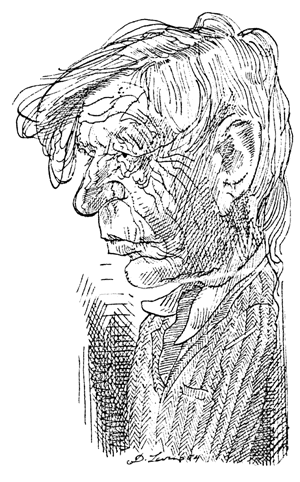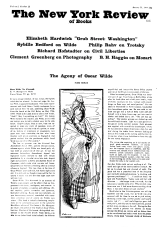In the caravan hauling Auden up Parnassus, the poet himself cuts sometimes an odd figure. First, this is simply because he is alive and kicking in the midst of a ceremony that still seems, despite all the modern precedent for it, one that might decently be reserved for a later time. True, we must all be thankful when honors come to living artists, but, entire books about them: this is different, this is not the conferring of the laurel, this is some chillier touch on the brow.
Living, the poet has not only the right to speak for himself and the right to keep private whatever he may not wish to say in public, to put under seal for a term, like State Papers, the secret treaties and communiqués of his private life. He has also a duty to speak for himself. He must make himself clear to his own time by his own means, in his own voice. Neither his own nor others’ asides to his audience can help him here. The books are saying, then, what? That the poet has lived in several times, has out-lived his time, has failed to make himself clear or has too completely succeeded and it is over now? Why can’t we read the poems, and read if we must the bleats and blasts of the reviews of the poems—other contemporaries’ struggles with them? Must we also ourselves be posterity? Can we look at living poets under the aspect of marble?
But Auden has asked for this treatment, perhaps not least by continually disclaiming his own suitability for a noble white bust; he won’t hold still, and he keeps sticking his tongue out. Yet he has always written a great deal about himself. in prose as well as in verse. This, of course, is one of the puzzles he makes that ask for treatment. He could not have hoped for better than Monroe K. Spears gives him in The Poetry of W. H. Auden. Spears insists he has come to praise and not to petrify, and finds his reason for the book in correcting the misinformation spread, he says, by Richard Hoggart’s Auden and by Joseph Warren Beach’s The Making of the Auden Canon, but principally in the “serious obstacle to understanding” created by Auden himself when he arranged his Collected Poems of 1945.
This famous arrangement was asking for, defying, and at the same time evading or appearing to evade the kind of concern with his works that brought about these books, and it has thus, too, helped swell the caravan to Parnassus. In 1945, he outraged the admirers of his earliest poems by omitting some of them, breaking others up, or giving them foolish titles and scattering them in the first-line alphabetical order of all the rest; the poems of the Liberal period he partly re-wrote, as Beach explains. to make them jibe with his new religion. It is true that to a reader who knew only that volume Auden would present a curiously patch-work and baggy figure.
Then in one breathless exhibition of sawing a man in four parts, while pigeons and rabbits named Heidegger and Hegel, Niebuhr and Groddeck, popped out of hats all over the stage, Randall Jarrell demonstrated the anatomy of this figure. The essay, “Freud to Paul: The Stages of Auden’s ideology,” appeared in Partisan Review, Fall, 1945, and was never, I think, re-printed. Spears refers to it as “brilliant but inimical,” and quotes sparingly but honorably from it, as he does from Beach. But Spears himself has come to praise and expound, not to anatomize, nor is it really his job to expound Jarrell, although it might seem there was little enough left to say after “Freud to Paul” except to slow it down, say it more patiently, and put the poems themselves in where they belong. Spears shares, apparently, Auden’s religious bent, sympathizes with the shifts of his ideas and his rhetoric, values his work chiefly on its own terms. There is some reason for a sympathetic tracing of Auden’s shifts, for a thorough and accurate index to the poems and their dates, and for a reasonable account of the poet’s life (with which the poet assisted) that will serve those too young or too far from gossip to have any idea what it has been. All this Spears does modestly and carefully, drawing on many widely-scattered sources. The notes sometimes have that uneasy literalness that the living must suffer in “Lives,” somewhere between the flat fact and the ludicrous slip; left out is all that is gossip about the living, and character analysis about the dead.
The poem is dedicated to Auden’s particular friends at the University of Michigan, Mr. and Mrs. Albert K. Stevens (Auden mistakenly gives the Christian name as “Arthur”); the occasion was the birth of their son, Auden Stevens, in 1943.
If Spears seems modest in his scoldings of Auden, perhaps that is appropriate for a book—an entire book. It was not his primary job, as he saw it, to ask what happened to the commanding power that could create first the abrupt “magical” poems, then the rhetorical poems in a language become already playful, in part; and then for a long time in the Forties, in the longest poems, could seem to be writing in a collapsed language of philological jokes, astoundingly witless:
Advertisement
How tempting to trespass in these Italian gardens
With their smirk ouches and sweet-smelling borders,
To lean on the low
Parapet of some pursive fountain
And drowse through the unctuous day.
But it takes a kind of greatness to be that bad. Violent, massive urges of the mind and spirit, and a great determination to speak, to order and to utter, are necessary to drive a man through the shifts and passes that Auden has allowed himself so publicly to suffer. The job of a writer is not to be correct, nor to give good advice, nor even to “write well” in any recognizable way. He has to record. Auden has done this now for some thirty-five years. Parnassus; he himself has long claimed that he was content to “picnic on the lower slopes with Prior.” His longer works in recent years have been the operas, and a libretto, he insists, is secondary to the music. Second to Stravinsky, of course, but still second. And these days he issues his ruminative set-pieces, extraordinarily complex in all the contrivances of versification, and flat: the art which dozens of poets now have mastered, and could do, in any one case, surely, as well as he does. They could write the poems, we suppose, dozens of young men could. And yet not really.
If the skill and contrivance can be theirs, and the appearance of an extraordinary fluency and gaiety of language—and even some of the intelligence—what cannot be theirs is the resonance that sounds from one of these poems to another, and sounds now through all of Auden’s works. It sounds in his latest theme, the acceptance of Dame Kind, and saves that acceptance from presumption. It has been earned by the long mastery and the long suffering and courage of a career. This is what we mean by Parnassus. We do not ask whether or not it is interesting when Auden tells us now, in one of those tourist postcards—the most recent that I know of—how he gets himself to bed.
…since my infantile entrance
at my mother’s bidding into
Edwardian England
I have suffered the transit over forty
thousand times,
usually, to my chagrin, by myself;
about
blended flesh, those midnight colloquia
of Darbies and Joans,
I know nothing, therefore, about
certain occult
antipathies perhaps too much…
I don’t know how many lines of poetry Auden has written, far more than forty thousand, many for each night and many for each morning. Nor does anyone know how many thousand nights and days the English language will endure.
This Issue
January 23, 1964




